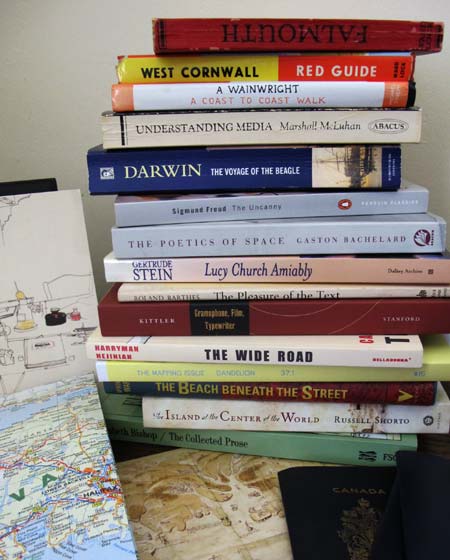Since 1996 I’ve been noting the author and title of each book I’ve read in a red book a little larger than A5 size, worn at the spine now, but with plenty of pages left as there were plenty of pages to begin with. Since 2005 I’ve been duplicating those entries here on Lapsus Linguae. Whether in book or digital form, the resulting document cannot properly be called a reading list. I’ve only ever listed books read, and only those read cover to cover. In the beginning this made sense because I mostly only read books and lots of them and almost all of them from cover to cover. I still read lots of books, but finish fewer of them.
So much of what I’m reading these days is research-related, parsed for the parts I need, those parts then heavily annotated, read and re-read. I read more online now that I used to, but not books – articles. I also spend a lot more time in libraries than I used to, but rarely for book-related reasons. Most of my time at the Bodleian Library this year has been spent with the Marconi Archive, sifting through boxes of loose sheets of papers. Though I’ve read more than a book’s worth of correspondence written in Marconi’s atrocious handwriting, that reading is not reflected here. At the British Library, much time has been spent leaning over large tables in the Maps and Manuscripts reading rooms. Perhaps Joseph Frederick Wallet Des Barres, The Atlantic Neptune should appear on this list. It is a book, a massive book, three volumes worth. Though it contains charts rather than chapters, I’ve read every page. Same goes for John Dee’s 1580 map of the world upon the back of which Dee outlines England’s claim to the America’s for Queen Elizabeth. It is only one page, or sheet of vellum rather, but it may be one of the most important documents in Canadian history. And then there are all the variations on Samuel de Champlain’s maps of Nouvelle-France I’ve pored over, and the vintage guide books I’ve not followed, and the stacks of post cards…

[ desk stack 09/09/2011 ]
Over the past two years this habitually kept list of authors and titles of books read has become less and less and less representative of what I’m actually reading. Which makes it all the more interesting in certain ways. Map-related books figure prominently, as to voyages and travelogues and books on walking. Media theory, of course. And network communications. A number of books listed here are re-reads. I got most of the way through A Hacker Manifesto years ago, but had to return it to the library eventually, with fines owing. Foucault makes way more sense to me now than in 1998, when I first attempted the same battered copy of The Order of Things I have with me here in England. The Rings of Saturn is even more haunting now after having walked in Suffolk myself. We’ve all read bits and pieces of The Travels of Sir John Mandeville – it’s almost odd to read them together at last, all of a piece. Darwin is an elegant prose stylist, who knew? Why did it take me so long to stumble over Cha’s brilliant Dictee? The year’s reading began with the utterly original Riddley Walker and ended with its author Russell Hoban’s passing. So many quirky odd-ball intriguing wandering wonderful books browsed, borrowed, bought and begun in between. Other still on the go. Those finished, listed below:
- McKenzie Wark, A Hacker Manifesto
- W. G. Sebald, The Rings of Saturn
- Theresa Hak Kyung Cha, Dictee
- Michel Foucault, The Order of Things
- Mandeville, The Travels of Sir John Mandeville
- Hakluyt, Voyages and Discoveries
- Gillian Cookson, The Cable
- Courtney Rowe, Marconi at The Lizard: The story of communication systems at Housel Bay
- J. G. Ballard, Concrete Island
- Iain Sinclair, Ghost Milk: Calling Time on the Grand Project
- William Gibson, Zero History
- Douglas Coupland, Marshall McLuhan: You Know Nothing of My Work!
- Roberto Simanowski, Digital Art and Meaning: Reading Kinetic Poetry, Text Machines, Mapping Art, and Interactive Installations
- Francesco Careri, Walkscapes: Walking as an Aesthetic Practice
- Carla Harryman & Lyn Hejinian, The Wide Road
- Gertrude Stein, Lucy Church Amiably
- Karen Russell, Swamplandia
- McKenzie Wark, The Beach Beneath the Street: The Everyday Life and Glorious Times of the Situationist International
- Guy Debord, Comments on the Society of the Spectacle
- Friedrich A. Kittler, Gramophone, Film, Typewriter
- Marshal McLuhan, Understanding Media: The Extensions of Man
- Robert C. O’Brien, Mrs Frisby and the Rats of NIMH
- Lydia Davis, Cows
- Adam Lebor, The Budapest Protocol
- Russell Shorto, The Island at the Center of the World: The Epic Story of Dutch Manhattan and the Forgotten Colony that Shaped America
- Charles Darwin, The Voyages of the Beagle
- Lauren Beukes, Zoo City
- Ben Marcus, The age of Wire And String
- Steven Millhauser, In The Penny Arcade
- Sandra Barry, Elizabeth Bishop: Nova Scotia’s “Home-made” Poet
- Brett C. Millier, Elizabeth Bishop: Life and the Memory of It
- Jean-Jacques Lecercle, Deluze and Language
- Maya Merrick, Sextant
- H.D., end to torment
- Andrea di Robilant, Venetian Navigators: The Voyages of the Zen Brothers to the Far North
- Franco Moretti, Graphs, Maps, Trees: Abstract Models for Literary History
- Rachel Hewitt, Map of a Nation: A Biography of the Ordnance Survey
- Jeffrey Sconce, Haunted media: Electronic Presence from Telegraphy to Television
- Joseph Conrad, Heart of Darkness
- Judith Schalansky, Atlas of Remote Islands: Fifty Islands I Have Never Set Foot on and Never Will
- Elisabeth Belliveau, Don’t Get Lonely Don’t Get Lost
- Jonathan Safran Foer, Tree of Codes
- Jay David Bolter, Writing Space: Computers, Hypertext and the Remediation of Print
- Rita Raley, Tactical Media
- Daniel Defoe, A Journal of the Plague Year
- Russell Hoban, Riddley Walker


